Here's something very very brief I wrote this morning on the office computer in response to a friend who said that the Catholic Church is a cult and Peter was not the first Pope:
Yes, the Catholic Church is a cult, the cult of Jesus Christ.
Here’s how a cult is defined by the Webster dictionary:
Dictionary.com Unabridged (v 1.1) - Cite This Source
cult ![]()
![]()
![]() ʌ - Show Spelled Pronunciation[kuhlt] Pronunciation Key - Show IPA Pronunciation
ʌ - Show Spelled Pronunciation[kuhlt] Pronunciation Key - Show IPA Pronunciation
–noun
| 1. | a particular system of religious worship, esp. with reference to its rites and ceremonies. |
| 2. | an instance of great veneration of a person, ideal, or thing, esp. as manifested by a body of admirers: the physical fitness cult. |
| 3. | the object of such devotion. |
| 4. | a group or sect bound together by veneration of the same thing, person, ideal, etc. |
| 5. | Sociology. a group having a sacred ideology and a set of rites centering around their sacred symbols. |
| 6. | a religion or sect considered to be false, unorthodox, or extremist, with members often living outside of conventional society under the direction of a charismatic leader. |
| 7. | the members of such a religion or sect. |
| 8. | any system for treating human sickness that originated by a person usually claiming to have sole insight into the nature of disease, and that employs methods regarded as unorthodox or unscientific. |
–adjective
| 9. | of or pertaining to a cult. |
| 10. | of, for, or attracting a small group of devotees: a cult movie. |
[Origin: 1610–20; <>cultus habitation, tilling, refinement, worship, equiv. to cul-, var. s. of colere to inhabit, till, worship + -tus suffix of v. action![]() ]
]
So, in instance 1,2,4 and 5, the Catholic Church is indeed the cult of Jesus Christ.
So yes, the Catholic Church is a cult, and proud of it =)
Peter is the Rock on which the Church is built.
Here’s how we deduce this fact:
Joh 1:42 Then he took Simon to Jesus. Jesus looked at him and said, "Your name is Simon son of John, but you will be called Cephas." (This is the same as Peter and means "a rock.")
In Aramaic, the language Jesus spoke, Kepha means rock. In Greek, there’s the masculine form of kepha, Petros and the feminine form,
In Matt 16, we see Jesus promising to build His Church on Peter, the Rock.
And Simon Peter answered and said, You are the Christ, the Son of the living God.
Jesus answered and said to him, You are blessed, Simon, son of Jonah, for flesh and blood did not reveal it to you, but My Father in Heaven.
And I also say to you that you are Peter, and on this rock I will build My church, and the gates of hell shall not prevail against it.
And I will give the keys of the
Peter, as the spokesman of the Apostles, confesses Jesus as the Christ, the Son of the Living God. Jesus in turns recognizes Simon as Son of Jonah and says that Peter spoke by a special revelation from Heaven. He then says the Peter, the Rock that on this Rock, which is clearly a play on words, He would build His Church. In Aramaic, in which Jesus was speaking, He would say “You are Kepha and on this Kepha I will build my Church”. It’s pretty clear. And it is Jesus who is the builder here, so He’s not the foundation that He is speaking of. Jesus is the real foundation, but here, He is building. He is the builder who builds on the Rock of Peter.
The most important part of this verse is the conferral of the of the keys to Peter. In the Old Testament episode, Is 22:20-23 which Jesus is alluding to, the Keys of the
Isa 22:15 So says the Lord, Jehovah of Hosts, Go, go up to this treasurer, to Shebna who is over the house. Say
And in that day it shall be, even I will call My servant Eliakim the son of Hilkiah.
and I will clothe him with your robe, and will fasten your girdle on him, and I will give your authority into his hand. And he shall be a father to the people of
And the key of the house of David I will lay on his shoulder; so he shall open, and none shall shut; and he shall shut, and none shall open.
And I will fasten him as a nail in a sure place; and he shall be for a glorious throne to his father's house.
The Keys imply authority, the authority of the King himself and the person who possessed the Keys is Over the House, the prime minister or vicar as it were. The Holder is Father to the people of
In Matt 18:18, the power to bind and loose is conferred to all the Apostles collectively, when they are in agreement, but in Peter individually in 16:18 by his sole authority without qualification.
With this in mind, even though perhaps Peter and the Eleven did not realize it yet, we can see the beginning of the primacy of Peter in the Church.
Jesus also tasks Peter with another task to strengthen his brethren after Christ prayed for him and to feed Christ’s Sheep.
Let’s look at the episode.
And the Lord said, Simon, Simon, behold, Satan has desired you(plural, meaning all the Twelve), that he may sift you as wheat. But I have prayed for you(you, singular, only Peter), that your faith fail not. And when you are converted, strengthen your brothers.
(Luk 22:31-32)
We see Jesus telling Peter that Satan wanted to tempt all of them but Jesus was praying for Peter alone. Peter is then tasked to strengthen his brothers, the Eleven.
Here’s another episode.
Then when they broke fast, Jesus said to Simon Peter, Simon, son of Jonah, do you love Me more than these? He said to Him, Yes, Lord, You know that I love You. He said to him, Feed My lambs. He said to him the second time, Simon, son of Jonah, do you love Me? He said to Him, Yes, Lord, You know that I love You. He said to him, Feed My sheep. He said to him the third time, Simon, son of Jonah, do you love Me? Peter was grieved because He said to him a third time, Do you love Me? And he said to Him, Lord, You know all things, You know that I love You. Jesus said to him, Feed My sheep. Truly, truly, I say to you, When you were young, you girded yourself and walked where you wished. But when you grow old, you shall stretch forth your hands and another shall gird you and carry you where you do not wish. He spoke this signifying by what death he should glorify God. And when He had spoken this, He said to him, Follow Me.
(Joh 21:13-19)
Peter’s triple affirmation atoned for his triple denial. And Peter is tasked by Jesus to feed his lambs and His sheep.
The Apostles had successors who carried on their task of evangelization. In Acts, we read of this episode:
And in those days Peter stood up in the midst of the disciples and said, (the number of names together was about a hundred and twenty,) Men, brothers, this Scripture must have been fulfilled, which the Holy Spirit by the mouth of David spoke before concerning Judas, who became guide to those who seized Jesus. For he was numbered with us and had obtained part of this ministry. Indeed, then, this one purchased a field with the reward of unrighteousness. And falling headlong, he burst apart in the middle, and all his bowels gushed out. And it was known to all the dwellers at
(Act 1:15-26)
Judas place as one of the Twelve was replaced by Matthias, who was then numbered among the Eleven. So this Apostolic tradition was carried on and the bishops today are successors of the Apostles by the laying on of hands. Peter in his turn was succeeded by Linus after his own death.
In short, this is what the Pope, the Father of the People of the New Jerusalem, the Christian Church on Earth is and does.
He holds the Keys of the Kingdom and is over the house when the Master is away, therefore he is Vicar of Christ on Earth.
Individually, he has the power to bind and loose and Jesus promised to bind and loose in Heaven what Peter has bound and loosed on earth. Therefore, Peter, when binding and loosing something on the whole Church must be protected from error, or else Jesus, by virtue of His promise would have to bind and loose error in Heaven. This is the infallibility of the Pope. The
Peter is also asked to strengthen his brothers. That’s what the Pope does, strengthens and corrects when the need arises.
Peter is also tasked with feeding all of Christ’s Sheep and Lambs, so he is Pastor (which means Shepherd) of the
That’s it. The Papacy in Scripture.
![[Unam Sanctam]](https://blogger.googleusercontent.com/img/b/R29vZ2xl/AVvXsEiymQ2adTjpZ1ABhPBbBBquiPCxeQrc4Jy_97vOikT0wGQeJleriiXQy6ebnb0jrYe-TfvcK77txStB4aIwVAdD41ZdMkVfNtFGC0JX6LBV9B8mfeRZaIAM7Sj-011ag3DiKQzv/s1600/headerdivinemercy.jpg)











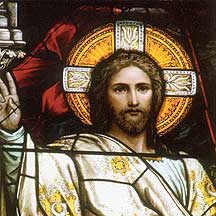







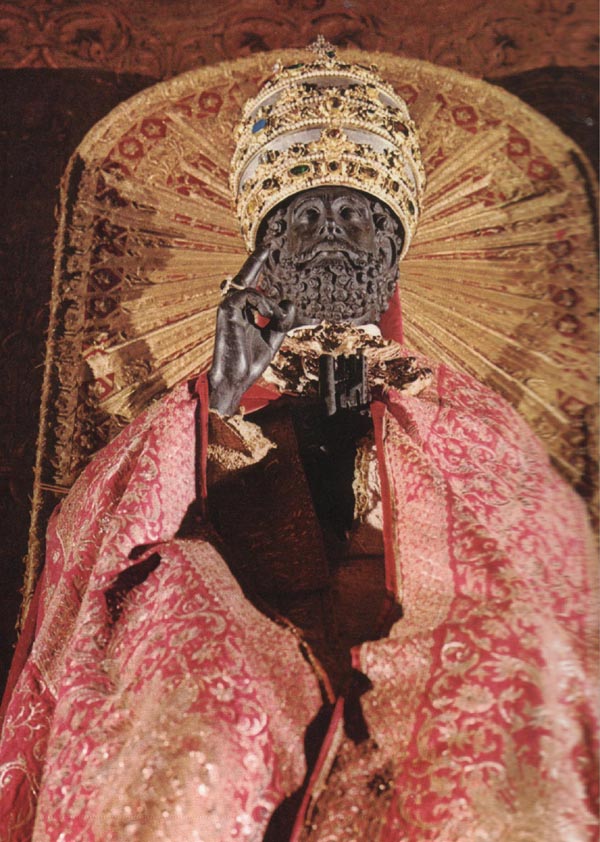
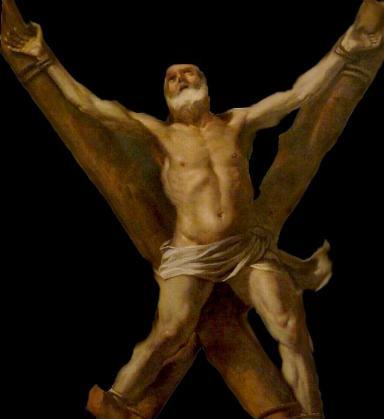




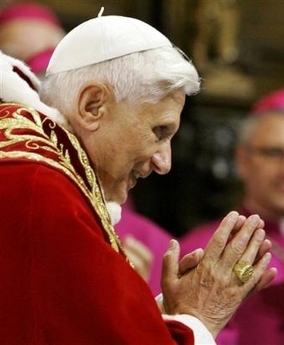






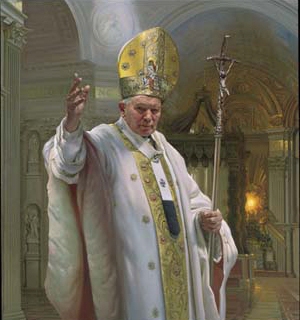
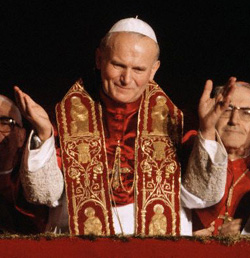
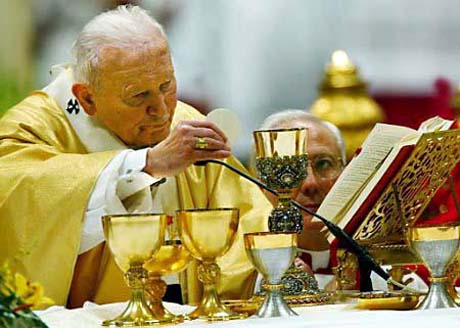







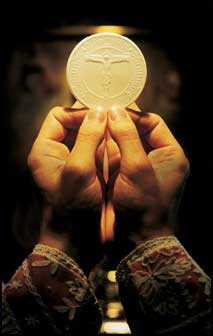
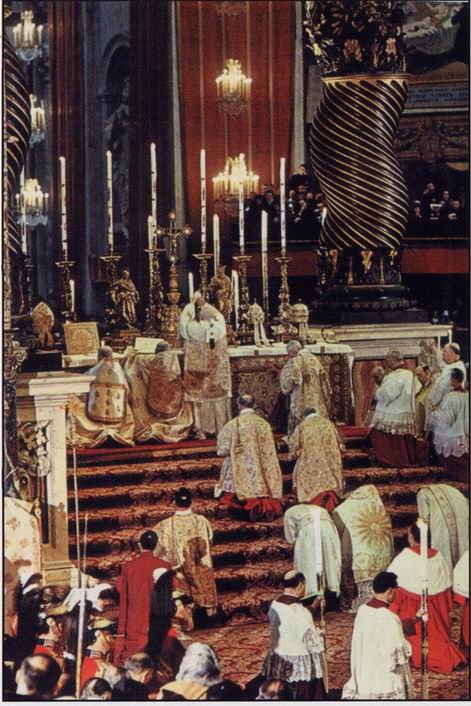

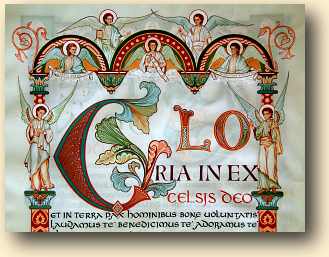

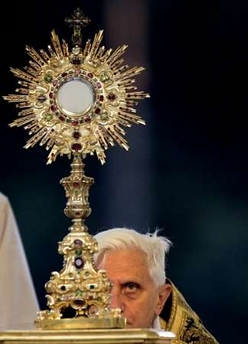


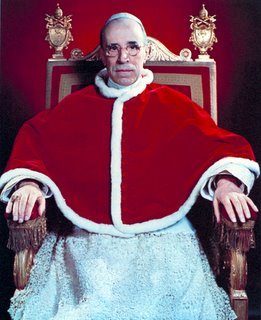




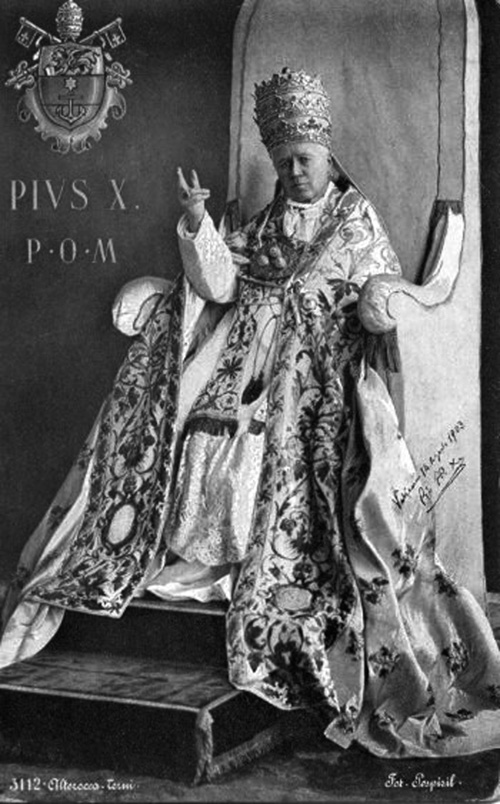



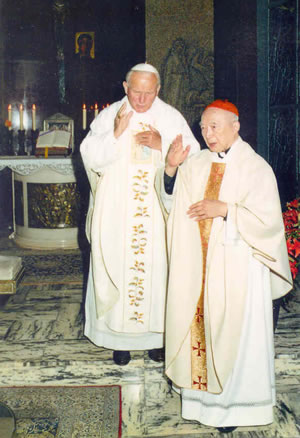





No comments:
Post a Comment